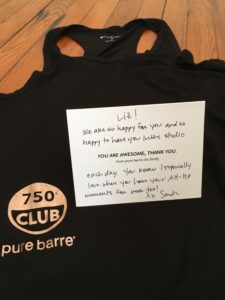 Exercising at my local Pure Barre studio has become one of my strongest and most consistent habits. Since September 1, 2014, I’ve taken more than 750 classes.
Exercising at my local Pure Barre studio has become one of my strongest and most consistent habits. Since September 1, 2014, I’ve taken more than 750 classes.
Earlier this month, the studio honored me for this accomplishment. The celebration featured a handwritten note from the owner (who’s also one of my many teachers), balloons, a shout out in class, a $75 gift card, and a special shirt.
Of all these acknowledgements, the most meaningful was the last sentence in the teacher’s note: “You know I especially love when you have your AH-HA moments for work too!”
Yes, my Pure Barre classes have evolved to serve two purposes: 1) lifting, toning and burning muscles and 2) generating insights in my unconsciousness.
Over the past 49 months, I’ve probably had at least 500 insights in class. They’ve ranged from low level to strong “Ah-ha”’s with a few stronger “Eureka!” moments.
And even better, I’ve been able to capture and use most of these insights – which isn’t always easy – thanks to the studio’s supportive environment.
What if we could turn our offices into insight-generating spaces? We’d all be much more engaged, innovative and flexible at work. We might improve our memory too.
The power of insights was front and center again at this year’s NeuroLeadership Institute Summit, which took place just days after my Pure Barre celebration.
Insights that you generate yourself rather than get from others are the most valuable because they:
- Serve as an active ingredient in your learning and changing. When you get an insight, your brain starts combining data in a new way. The neural connections in your brain change.
- Stimulate you to remember and start thinking differently. Once you’ve had an insight and become aware of it, you’re inclined to remember it and start to think differently.
- Propel you into action, especially if the insight is strong. You’re also more inclined to act when you think of something yourself rather than hearing it from your boss or someone else. For example, when I get ah-ha moments about connections, such as people who could benefit from meeting one another – either virtually or in person, I make introductions generally that day. Or, insights about how to handle a work challenge also inspire me to act quickly.
Because self-generated insights fuel learning and drive change, we need to start designing for them intentionally, as we discussed at the Summit.
The implications are huge for learning and development as well as change leadership. For example:
- Finding “insight facilitators” who can set you and your environment up for self-generated insights will be more valuable than having experts teach volumes of technical content.
- Measuring the strength of insights and the resulting actions you take will be a more meaningful gauge of success than assessing whether you enjoyed the experience.
- Ensuring you and your team members feel safe enough to decide how you want to spend your time. For example, can you take chunks of time (an hour or so) to go off by yourselves, think deeply and let your minds wander, and then regroup to share your insights? Working this way can help you be more strategic. Plus the custom action plan you devise will result in greater buy-in to change than adhering to the steps in a traditional organizational change model.
Even with this change in attitude and approach, insights won’t happen on command or on a schedule. You can’t force them.
Instead, you need to put yourself into a physical space and your brain into a mental state conducive to insights.
That’s what happens to me at Pure Barre. My phone is in another room, my muscles are straining, my brain is relaxed, and I’m happy to be doing something good for my body. My mind wanders, shutting out the outside world.
As if by magic yet actually by science, my quiet mind generates a quiet insight I’m able to detect and apply.
In the Pure Barre setting, there’s usually an unintended consequence that I’m willing to live with. Insights cause my mind to stray so far from what we’re doing in class that my teacher often feels a need to readjust my leg or arm into the proper position.
After class, I apologize for zoning out and then enthusiastically exclaim that I got another insight to use for work. Getting busted is worth it!
Are you open to having more insights? If so, I’m glad to help as your insight facilitator!

This is so expertly and thoughtfully written, so much truth to what you write about this process being most valuable when self-generated, thank you! For me, this is something I attribute to God. I see them as insights given to me by God in order to produce personal change and transformation in my attitudes and thought-life. They come, often triggered, from time spent upon reflection of any given topic or situation. Then I actively apply these insights to my life in order to overcome false thinking or attitudes. Wonderful topic, thank you for sharing!